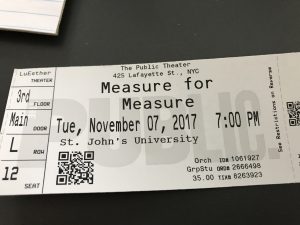[I started this post on 11/8 and left it unfinished for a week or so. As the news continues from Weinstein to Moore to Franken, Measure seems more and more the play of our moment.]
On a stormy election night in downtown Manhattan, I watched Elevator Repair Services Measure for Measure for a second time, in the company of the few straggling students who made it out in the rain. The first time I saw the show it was at the end of its previews on Sept 29, almost six weeks earlier. I blogged then about experimental acting and textualizing the stage, about the intermission-less breakneck pace, about time and emotion, and about clowning. Six weeks later — after the six weeks that began with this Times story about Harvey Weinstein — all I could see on stage was sexual aggression.
The word consent appears three times in the play. The last of the three echoed in my head as I piloted the good ship Subaru north through rainy highways. “I will not consent to die this day,” says the murderer Barnadine. His jailers listen to him. White male privilege works even among condemned criminals. Why can’t anyone else withhold consent in Barnadine’s imperious and impervious way?
Angelo had previously sexualized the word in order to sharpen his assault on Isabella. “Fit thy consent to my sharp appetite,” he commands. She resists — but the Duke-Friar, and the play, require that she collude with and eventually reward his aggression.
The word’s third appearance comes in the mouth of the Duke-Friar, asking and manipulating Mariana into taking Isabella’s place in Angelo’s bed: “It is not my consent, but my entreaty too.”
All three times consent appears in male mouths, voicing Barnadine’s resistance, Angelo’s assault, and the Duke machinations. Isabella never offers her consent, though the men in the play do nothing but ask her to comply with their various desires. It’s not just bad men like Angelo or ambivalent ones like Lucio who bully her; the Duke does too, and so does her condemned brother. “Sweet sister, let me live,” Claudio implores. I’ve never heard so clearly as during this performance that her reply is a response to yet another attempt to dominate her: “Is’t not a kind of incest, to take life / From thine own sister’s shame?”
Isabella’s silence after the Duke’s last-minute proposal is a famous theatrical crux; I’ve seen it played with a full range of emotions, from ecstasy to defiance to horror. In Elevator Repair Service’s rendition, Isabella seemed mystified as the Duke ran off stage alone.
Is there a legible resistance in her silence? If not, can we build or imagine one? We need resisting Isabellas. Not to mention morally conscious Dukes.

[…] of sexual harassment and bed-trick near-assault, at the start of the #metoo moment last fall. (I wrote a bit about this after seeing Measure twice at the Public last fall.) Twelfth Night gently satirizes the erotic […]